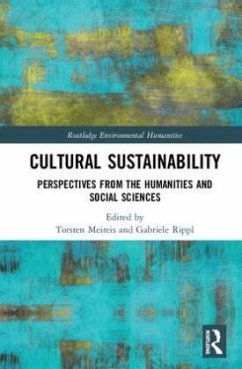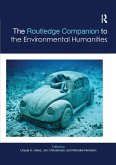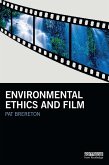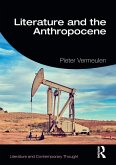If the political and social benchmarks of sustainability and sustainable development are to be met, ignoring the role of the humanities and social, cultural and ethical values is highly problematic. People's worldviews, beliefs and principles have an immediate impact on how they act and should be studied as cultural dimensions of sustainability.
Collating contributions from internationally renowned theoreticians of culture and leading researchers working in the humanities and social sciences, this volume presents an in-depth, interdisciplinary discussion of the concept of cultural sustainability and the public visibility of such research. Beginning with a discussion of the concept of cultural sustainability, it goes on to explore its interaction with philosophy, theology, sociology, economics, arts and literature. In doing so, the book develops a much needed concept of 'culture' that can be adapted to various disciplines and applied to research on sustainability.
Addressing an important gap in sustainability research, this book will be of great interest to academics and students of sustainability and sustainable development, as well as those studying sustainability within the humanities and social sciences, such as cultural studies, ethics, theology, sociology, literature and history.
Collating contributions from internationally renowned theoreticians of culture and leading researchers working in the humanities and social sciences, this volume presents an in-depth, interdisciplinary discussion of the concept of cultural sustainability and the public visibility of such research. Beginning with a discussion of the concept of cultural sustainability, it goes on to explore its interaction with philosophy, theology, sociology, economics, arts and literature. In doing so, the book develops a much needed concept of 'culture' that can be adapted to various disciplines and applied to research on sustainability.
Addressing an important gap in sustainability research, this book will be of great interest to academics and students of sustainability and sustainable development, as well as those studying sustainability within the humanities and social sciences, such as cultural studies, ethics, theology, sociology, literature and history.
"Sustainability involves much more than energy-efficient technologies and landscaping strategies suited to particular ecosystems. Ultimately, the quest for sustainability requires us to know ourselves better, our human nature, our values and desires. Cultural Sustainability, in exploring the human dimension of sustainability, is an important contribution to the environmental humanities." - Scott Slovic, Professor of Literature and Environment, University of Idaho, USA
"A mantra, a slogan, a difficult practice: "sustainability" is the keyword of our time. But can the humanities contribute to shaping more ecological lifestyles and cultural policies? How sustainable are we? Written by prominent international scholars, the essays in this very timely volume investigate the cultural dimension of sustainability using the toolkit offered by the environmental humanities. Whether you are a teacher, a policy maker, or simply wish to learn more about this critical issue, Cultural Sustainability: Perspectives from the Humanities and Social Sciences is a superb book that deserves to be at the top of your reading list." - Serenella Iovino, Professor of Italian and Environmental Humanities at the University of North Carolina, Chapel Hill, USA
"Transformative science in support of sustainability should take the manifold contributions of the humanities into account. Cultural Sustainability makes that an easy, and sometimes even entertaining, task." - Uwe Schneidewind, Professor of Sustainable Transition Management and President of the Wuppertal Institute for Climate, Environment and Energy, Germany
"Cultural sustainability is not an additional dimension of sustainability but an integral understanding of the whole concept of sustainability: It transforms knowledge about ecological, social and economic problems into a new narrative of progress, quality of life and the position of man in nature. This volume sketches the rich scope and complexity of that understanding by bringing together outstanding contributions from the whole field of the humanities." - Markus Vogt, Professor of Christian Social Ethics, LMU Munich, Germany
"Written by leading scholars in humanities and social sciences, these ground-breaking essays on the cultural dimension of sustainability meet an urgent need of environmental policymakers and educationalists. Drawing together findings on the role of traditions, world views and values in both blocking and facilitating sustainable development, and on the ways in which cultural products participate in the ongoing process of (re-)shaping the social imaginary, the volume provides the first comprehensive and systematic mapping of the field. It will serve as a key point of reference and prompt further research." - Axel Goodbody, Professor of German Studies and European Culture, University of Bath, UK
"The concept of sustainability is likely to dominate discussions of natural and cultural environments in the twenty-first century. Cultural Sustainability looks beyond the natural sciences and provides a timely extension of the concept. The volume provides an impressively wide-ranging, thorough discussion of debates around sustainability in various disciplines. By bringing the illustrious tradition of comprehensive study in the humanities to bear on a pressing environmental issue, it makes an important contribution in the field of environmental studies and beyond." -Timo Müller, Professor of American Literature, University of Regensburg, Germany
"The commitment for a sustainable culture is an important task of Christian churches and other religious communities. They need to advocate political and sociocultural change to regain an appropriate power balance between non-human nature and humankind. To further such efforts, ongoing research into the significance and meaning of cultural sustainability is tantamount. This book offers important and critical interdisciplinary insights into that research - a great resource for spiritual leaders." - Heinrich Bedford-Strohm, Professor of Social Ethics, Bishop of the Lutheran Church of Bavaria and Chairman of the Council of the Evangelical Churches in Germany
"A mantra, a slogan, a difficult practice: "sustainability" is the keyword of our time. But can the humanities contribute to shaping more ecological lifestyles and cultural policies? How sustainable are we? Written by prominent international scholars, the essays in this very timely volume investigate the cultural dimension of sustainability using the toolkit offered by the environmental humanities. Whether you are a teacher, a policy maker, or simply wish to learn more about this critical issue, Cultural Sustainability: Perspectives from the Humanities and Social Sciences is a superb book that deserves to be at the top of your reading list." - Serenella Iovino, Professor of Italian and Environmental Humanities at the University of North Carolina, Chapel Hill, USA
"Transformative science in support of sustainability should take the manifold contributions of the humanities into account. Cultural Sustainability makes that an easy, and sometimes even entertaining, task." - Uwe Schneidewind, Professor of Sustainable Transition Management and President of the Wuppertal Institute for Climate, Environment and Energy, Germany
"Cultural sustainability is not an additional dimension of sustainability but an integral understanding of the whole concept of sustainability: It transforms knowledge about ecological, social and economic problems into a new narrative of progress, quality of life and the position of man in nature. This volume sketches the rich scope and complexity of that understanding by bringing together outstanding contributions from the whole field of the humanities." - Markus Vogt, Professor of Christian Social Ethics, LMU Munich, Germany
"Written by leading scholars in humanities and social sciences, these ground-breaking essays on the cultural dimension of sustainability meet an urgent need of environmental policymakers and educationalists. Drawing together findings on the role of traditions, world views and values in both blocking and facilitating sustainable development, and on the ways in which cultural products participate in the ongoing process of (re-)shaping the social imaginary, the volume provides the first comprehensive and systematic mapping of the field. It will serve as a key point of reference and prompt further research." - Axel Goodbody, Professor of German Studies and European Culture, University of Bath, UK
"The concept of sustainability is likely to dominate discussions of natural and cultural environments in the twenty-first century. Cultural Sustainability looks beyond the natural sciences and provides a timely extension of the concept. The volume provides an impressively wide-ranging, thorough discussion of debates around sustainability in various disciplines. By bringing the illustrious tradition of comprehensive study in the humanities to bear on a pressing environmental issue, it makes an important contribution in the field of environmental studies and beyond." -Timo Müller, Professor of American Literature, University of Regensburg, Germany
"The commitment for a sustainable culture is an important task of Christian churches and other religious communities. They need to advocate political and sociocultural change to regain an appropriate power balance between non-human nature and humankind. To further such efforts, ongoing research into the significance and meaning of cultural sustainability is tantamount. This book offers important and critical interdisciplinary insights into that research - a great resource for spiritual leaders." - Heinrich Bedford-Strohm, Professor of Social Ethics, Bishop of the Lutheran Church of Bavaria and Chairman of the Council of the Evangelical Churches in Germany








